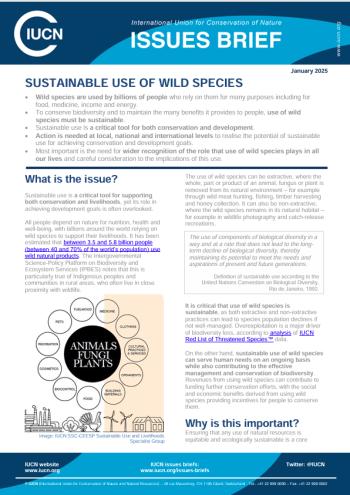
Correcting for the Inconveniences of Cultivation: Foraging as a Food Source in Southwestern Burkina Faso
Malnutrition is an important public health issue in Burkina Faso where 30 % of children are underweight for their age and 92% suffer from iron deficiency. Such statistics indicate that there is a significant lack of adequate nutrition in the country. With approximately 80% of the population employed in the agricultural sector, development projects have focused on increasing agricultural production and commercializing output to ameliorate poor nutrition. However, this strategy ignores the importance of local knowledge and food traditions, most notably by neglecting to acknowledge foraging as a significant source of food.
To address this concern, I seek to understand how commercialization impacts foraging practices, which other factors are correlated with use of foraging and what macro- and micronutrients are available through foraged foods. I will use data collected through structured surveys on the use of foraging, demographics, and nutrition. These were performed with approximately 150 female rice farmers from five different villages near the city of Bobo Dioulasso. Statistical analysis will be used to assess the relationship between foraged food consumption and commercialization, as well as other demographic variables. Preliminary results suggest foraged foods play a large role in daily diets, though there are many means through which they are accessed. Additionally, rice commercialization projects do not appear to have influenced foraging practices, though certain other demographic factors play a more significant role on foraging practices.
Morgan, Julia Deryn. (2018). Correcting for the Inconveniences of Cultivation: Foraging as a Food Source in Southwestern Burkina Faso. Macalester College, Geography Honors Project.
https://digitalcommons.macalester.edu/geography_honors/55
-
Julia Deryn Morgan
We support the free flow of information. Please share:
Form coming soon
Related Content
-

-

Review of African Social and Economic Development Volume 1
ByIbrahim Bàbátúndé Anobaarrow_forward2024 -

Economic Analysis: Climate Change and Wildlife Utilization on Private Land
ByJackson OtienoEdwin Muchapondwaarrow_forward2015
Get updates by email
Through impactful research, stakeholder engagement, and professional development, AWEI is supporting the wildlife economy across Africa. Please subscribe for occasional updates on our work and forthcoming events.
Sign up for a quarterly dose of AWEI insights
In a complex and changing world, AWEI generates strategic ideas, conducts independent analysis on wildlife economies, and collaborates with global scholar-practitioners to provide training and expertise for biodiversity conservation, climate resilience, and inclusive economic opportunities in Africa.
